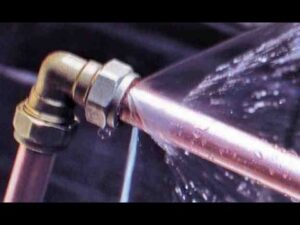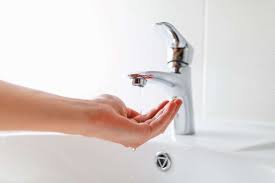As a homeowner, experiencing knocking and banging noises in your pipes and water lines can be a frustrating and disruptive problem. However, the good news is that there are several causes of these noises, and most of them can be addressed with the right knowledge and tools. In this article, we’ll explore the different reasons why your water pipes may be making knocking and banging noises and provide you with expert tips on how to address them.
Know What Causes Water Pipe Knocking
Before we delve into the various causes of knocking and banging noises in your water pipes, it’s essential to understand how water moves through your plumbing system. When you turn on a faucet or appliance, water flows through the pipes and creates pressure. The pressure can build up and cause vibrations, which, in turn, lead to the knocking and banging water pipes noises you may be hearing.
Now that we’ve established how water moves through your plumbing system let’s take a closer look at some of the causes of knocking and banging noises in your water pipes.
Water Hammer
One of the most common causes of knocking and banging noises in water pipes is water hammer. Water hammer occurs when the water flowing through your pipes comes to an abrupt stop, causing a shockwave to travel through the pipes. This shockwave can cause the pipes to rattle, creating the knocking and banging noises you hear.
Loose Pipes and Connections
Another cause of knocking and banging noises in water pipes is loose pipes and connections. Over time, pipes and connections can become loose due to regular use or changes in temperature. When this happens, water can move through the pipes and create vibrations, causing knocking sounds and banging noises.
High Water Pressure
High water pressure can also cause knocking and banging noises in your pipes. When the water pressure in your plumbing system is too high, it can create excessive vibrations, leading to the knocking and banging noises you may be hearing.
Water Flow Issues
Water flow issues can also cause knocking and banging noises in your pipes. If there are any obstructions in your pipes, such as debris or mineral buildup, it can impede the flow of water and create vibrations, leading to knocking and banging noises.
Air in pipes
Air in pipes can also cause knocking and banging noises in your plumbing system. When the air gets trapped in your plumbing pipes, it can create pressure and cause vibrations, leading to knocking and banging noises.
Scale buildup
Scale buildup can also cause knocking and banging noises in your plumbing system. Over time, mineral buildup can accumulate in your pipes, creating obstructions and impeding the flow of water. This can cause vibrations and lead to the knocking and banging noises you may be hearing.
Water temperature fluctuations
Lastly, water temperature fluctuations can also cause knocking and banging noises in your plumbing system. When the water temperature changes suddenly, it can cause the pipes to expand or contract, leading to vibrations and knocking and banging noises.
Assessing the Severity of the Problem
When you hear knocking or banging noises coming from your pipes, it can be quite alarming. Not only can it be irritating, but it can also be a sign of a bigger issue that could potentially cause damage to your home’s plumbing system.
The first step in addressing these noises is to assess the severity of the problem. Is it a minor issue that can be easily fixed, or is it a more serious problem that requires the attention of a professional plumber?
One way to determine the severity of the problem is to listen carefully to the sound of knocking or banging. If the noise is relatively quiet and occurs infrequently, it may not be a cause for concern. However, if the noise is loud and persistent, it could be a sign of a more serious problem.
Another factor to consider is the age of your home’s plumbing system. Older homes may have pipes that are more susceptible to wear and tear, which could lead to knocking or banging noises. In this case, it may be a good idea to have a plumber inspect your pipes to determine if they need to be replaced.
How to Determine the Extent of the Issue
If you suspect that the knocking or banging noises in your pipes are a cause for concern, there are a few things you can do to determine the extent of the issue.
First, you can try to pinpoint the location of the noise. If the noise is coming from a specific area of your home, such as the basement or a particular room, it could be a sign of a localized problem.
Next, you can try to determine if the noise is related to the use of hot water heaters or certain appliances or fixtures, such as a washing machine or dishwasher. If the noise only occurs when these appliances are in use, it could be a sign of a problem with the water supply line.
Finally, if you are still unsure about the extent of the issue, it may be best to contact a professional plumber for an inspection. A plumber can use specialized equipment to determine the cause of the knocking or banging noises and provide recommendations for repairs.
Potential Damage Caused by Water Pipe Knocking
Water pipe knocking may seem like a minor annoyance, but it can actually cause significant damage to your home’s plumbing system if left unchecked.
The most immediate concern is the risk of a burst pipe. If the knocking or banging is caused by a water hammer, which occurs when water abruptly changes direction in the pipes, it can create a shockwave that can weaken the pipes and cause them to burst.
In addition to the risk of a burst pipe, water pipe knocking can also cause damage to your home’s fixtures and appliances. The constant vibration and movement of the pipes can cause fittings to come loose, leading to leaks or even flooding.
Finally, water pipe knocking can also cause damage to your home’s foundation. The constant vibration of the water pipes banging at night can cause the foundation to shift, leading to cracks or other structural damage.
How to Address Water Pipe Knocking/Banging Noise
There are several ways to address this problem and restore peace and quiet to your home.
Check for Loose Pipes and Connections

One of the primary causes of water hammer is loose pipes and connections. Over time, the vibration and movement of hot water flowing through the pipes can loosen the connections between the pipes and the fittings, causing them to rattle and bang against each other. To check for loose pipes and connections, inspect all visible pipes and connections for signs of movement or separation. Tighten any loose connections with a wrench but be careful not to overtighten and cause damage.
Reduce Water Pressure

Another common cause of water hammer is high water pressure. The higher the pressure, the more forceful the water flow, and the more likely it is to cause the pipes to vibrate and produce noise. To reduce water pressure, locate the water pressure regulator valve, usually located near the main water shutoff valve, and adjust it to a lower setting. It’s essential to be cautious when making this adjustment, as reducing the pressure too much can cause low water flow and other issues.
Install Water Hammer Arrestors

Water hammer arrestors are devices designed to absorb the shock of the water flow and prevent the pipes from vibrating and producing noise. These devices are installed at the end of the water supply line, near the valve or fixture that is causing the problem. They contain a piston or air chamber that compresses when the water flow suddenly stops, absorbing the shock and preventing the noise from occurring.
Address Water Flow Issues

Water hammer can also occur due to issues with water flow, such as clogged pipes or valves. If the water flow is restricted, the pressure in the pipes can build up, causing the pipes to vibrate and produce noise. To address water flow issues, check for clogs in pipes or valves and clear them as needed. Additionally, consider upgrading to larger pipes or valves to improve water flow and reduce the risk of water hammer.
Other Possible Solutions
If none of the above solutions work, there are several other possible solutions to consider. One is to add insulation to the pipes to reduce vibration and noise. Another is to replace any worn or damaged pipes or fittings that may be contributing to the problem.
DIY vs. Professional Assistance
When to call a professional
While some knocking and banging noises in your pipes can be resolved with DIY solutions, there are some instances where it may be necessary to call a professional plumber.
If you are experiencing any of the following issues, it is recommended to seek professional assistance:
Continuous knocking or banging noises: If the same knocking noise or banging noises persist even after attempting DIY solutions, it may indicate a more serious issue that requires professional attention.
Leaking pipes: If you notice any signs of water damage or leaking pipes, it is important to have a professional plumber inspect your plumbing system. Leaking pipes can cause serious damage to your home and require immediate attention.
Old pipes: If your home has old or outdated plumbing, it may be best to have a professional plumber inspect your system to ensure it is functioning properly and to address any potential issues.
DIY solutions for minor issues
If you are experiencing minor knocking or banging noises in your pipes, there are some DIY solutions you can try before calling a professional plumber.
Tighten loose pipes: As mentioned earlier, loose pipes can cause knocking and banging noises. Check your pipes to see if they are securely fastened and tighten any loose pipes or fasteners.
Install water hammer arrestors: Installing water hammer arrestors can help supply pipes to absorb the shockwave created by water hammer and reduce knocking and banging noises in your pipes.
Adjust water pressure: If your home’s water pressure is too high, it can cause water hammer and knocking noises in pipes. Use a pressure gauge to check your water pressure and consider installing a pressure reducing valve if it is above 80 psi.
Summing Up and Final Thoughts
In summary, if you are experiencing knocking and banging noises in your pipes, start with the DIY solutions mentioned in this article, and if the issue persists or you are unsure how to address the problem, seek professional assistance. By taking action and addressing the issue promptly, you can ensure the longevity and functionality of copper pipes in your plumbing system.

